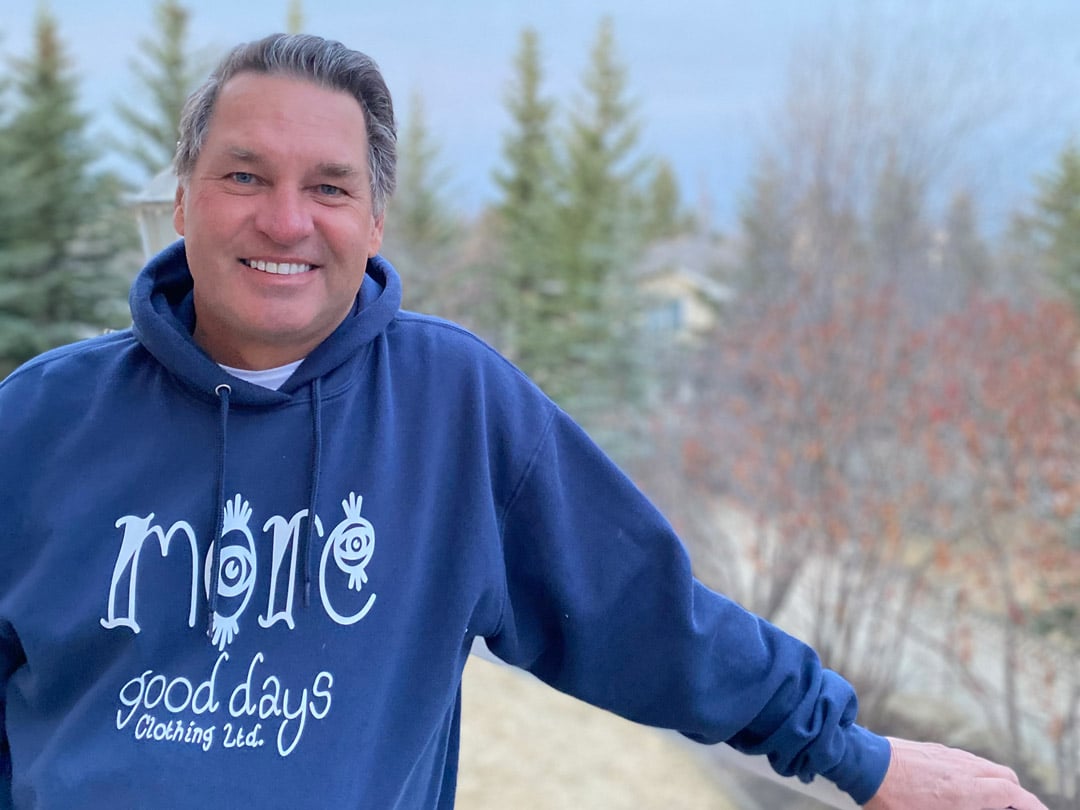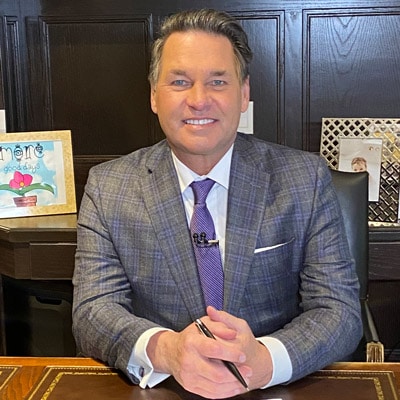Like any NHL goalie, I’ve had good games and bad games. And like any guy doing his job or just going about his day, sometimes those “bad games” or bad days turn into negative thoughts that won’t shut off. If those kinds of thoughts start taking over your life, as they did for me, I know where you’re coming from. I have a few tips that have worked for me.
I had just finished a career year; however, my mind only focused on the “bad” heading into the 1992-93 NHL season. It was my 10th year in the league, and NHL careers average around 3 years. So, I kept asking myself: “How much longer can I play at this level? How much longer will my career go on?”
We had 2 children at the time, and my wife, Donna, was pregnant with our 3rd. So, that added a lot of pressure. When the season started, the questions in my head became louder and louder. The thoughts shifted from rational to irrational, “You can’t do this anymore. You’re not good enough to stay at this level any longer. There are a lot better goalies than you. Someone is going to take your job.” My thoughts had become very cluttered in my head.
By late November, I’d reached a breaking point. On December 1st, we had a neutral site game in Milwaukee, and even though I was feeling unglued, I somehow got it together and pulled off a great game where I was named the 1st star.
That gave me some hope, but it only took a few days to go from feeling pretty good to feeling like the lousiest goalie in the league. My mental game affected my play, and I went into a slump that lasted almost 2 months.
Helping hands
Our head coach at the time was a guy named Barry Melrose. He recognized that I was struggling—not physically, but mentally—and saw that I needed to talk to someone.
In January, Coach Melrose walked into the dressing room, followed by (famous life coach) Tony Robbins. It wasn’t all that unusual to have celebrities in the room after games—this was L.A., after all. They went into Barry’s office for a minute, then they called me in. My thinking had become so negative that I thought, “Why would Tony Robbins wanna meet the lousiest goalie in the league?”
Barry said, “Would you be willing to work with Tony so we can help you get out of this slump? I agreed. Then he asked, “Would it be ok if I sat in on the session? I wanna learn more about you.”
And I thought, “Man, that’s really cool, My head coach, wants to understand me to help me get out of this slump.”
What I liked about Tony is that he spoke like an athlete. We were swearing and having an authentic conversation. It wasn’t just a clinical thing where I told him what I was going through. “When you feel really lousy about yourself, who do you feel like?” he asked. “It can be a real person, a movie character, a cartoon character.” And I said, “Actually, if you really wanna know the truth, I feel like Fred Flinstone in Mr. Slate’s office.”
When I was a kid growing up, I loved watching the Flintstones. When Fred would go into Mr. Slate’s office, his boss would criticize him, and Fred would just keep shrinking in his chair. I told Tony and Barry that when I’m in the net, and I let in a goal, and then I let in another one and another one, I feel like I’m shrinking on the ice.
Tony asked, “When you feel really good about yourself, who do you feel like?” And I said, “General Norman Schwartzkopf,” the guy who led the U.S. in the Gulf War. With his shoulders back and his chin out, he always looked like he was in charge of everything. I felt like that when I was playing really well. I could single-handedly control a game, and that’s a pretty cool feeling.
We worked on how I could get that control back, and we ended up deciding that I would have a laminated index card with notes on it. The first note was General Norman Schwartzkopf, and I’d look at this card before every single period I played.
I ended up playing another 5 years because of that transformation with Tony. I’m forever indebted to Barry for making the decision to take action to help me.
Family ties
My daughter, Kaitlin, was having her own mental health struggles, and before her diagnosis with anxiety and obsessive-compulsive disorder (OCD) in 2005, her life had become completely unmanageable. We took her to see a child psychologist in Calgary, and depending on how she was doing, she would see the doctor once or twice a week.
After four years of therapy, Kaitlin came to us, out of the blue, and said, “Mom, Dad, I’m starting to have more good days than bad.” A lot of people can relate to that because that’s what we’re trying to do. We’re trying to have more good days than bad ones.
I always tie this back to a conversation I had with Ron McLean about people around the world helping to create positive change for people living with mental health issues. Ron and I were texting back and forth, and then Ron, as he usually does, hit me with something brilliant: “Inner peace, what a quest.”
We’re all on a quest for inner peace and to have more good days than bad.
Troubles return, but this time it’s different
Fast-forward to the summer of 2019. I’ve been on Hockey Night in Canada for 21 years. But those same types of negative thoughts started creeping back into my mind: “How much longer can you do this? There are certainly better, younger and more talented broadcasters out there. You’ve had a good run, but it’s probably coming to an end.”
As the thoughts got louder, I recognized I was having irrational thoughts and that it was coming back to mental health. So, I started talking to a therapist, and it changed the course of my life. My first session was about an hour, and I cried the whole time. But I had to do it, it was really important work for me. I went once a week for months, and I’m happy to say that it changed my life in a better way. I’m more relaxed, and I now have the tools to help myself.
Tips to have more good days
There are a few things I’ve learned over the years through my mental health journey and supporting my daughter Kaitlin with hers. It’s going to be different for everyone, so it comes down to figuring out what works for you.
Take notice if there is a problem
It’s easy to focus on life or work, while pushing poor mental health down. Being able to recognize that something isn’t right is important.
There’s no shame in talking to someone
This is a big one. For me, it’s important to share and not keep everything bottled up inside. We all need someone to talk to. That may be a friend or a family member, and it may be a professional. If you’re struggling, you don’t need to struggle alone.
There’s no such thing as perfect
We can be our own harshest critics, so it’s good to know when you need to go easy on yourself. Sometimes things don’t work out the way you had hoped, and that’s ok. For my own mental health, I know there are times when I need to let go and walk away.
Talking about mental health is normal
Things are changing when it comes to conversations around mental health, and it’s an exciting time. It’s not like it used to be. Talking about mental health is normal. If you’re having a bad day, it’s ok to say you’re having a bad day. If you’re having a bad month, it’s ok to say that too. The more we talk about it, the more we see how common it is.

No-Cost Counselling
Access three virtual counselling sessions at no cost through TELUS Health MyCare™. Available to men in BC, AB, ON and QC without extended health benefits.
Finding what works for you
What works for me on a tough day may not work for you. You might have to try a few different things before figuring out what works. Here are a few things I like to do to help with my mental health:
- I really like taking long walks. I can walk for 1-3 hours, and it helps me clear my head.
- A drive in the morning helps me feel relaxed and peaceful.
- Sometimes when you’re struggling with mental health, you need to take a day off. For me, it’s the opposite. Working helps me stay focused and push out the negative thoughts. If I’m having a bad day, I prefer to go to work. But it’s different for everybody.
- I use index cards to write down important words that help me feel more positive and relaxed. I carry the index card around with me and look at it when I need to. Whatever you put on your card is personal to you; the words can be anything you want them to be.
I can definitely say that there are more good days than bad. I’m learning to go easier on myself and take the time I need to support my own mental health. If you’re struggling, try not to ignore it and find someone you can talk to.
When you’re feeling good, who do you feel like? Share in the comments below.


Dear Kelly,
You are my favourite commentator and I love your perspective on all matters in hockey. I so appreciate you sharing your personal experiences so openly…
My husband is a former Mountie and has anxiety and ptsd from his 35 years of service and in the last two years has been receiving counselling that has also been such a positive game changer for him, for our marriage and for our 13 year old son. Your openness is contributing to normalizing things for amazing, smart, strong men to seek support when head games might otherwise ruin things in a big way. So grateful to you and leaders like you for paving the way for others. Cheering for you always, Sharon
Philippians 4:6-7
“Be anxious for nothing, but in everything by prayer and supplication, with thanksgiving, let your requests be made known to God; and the peace of God, which surpasses all understanding, will guard your hearts and minds through Christ Jesus” 🙏❤️🕊
Thank you Kelly for lighting up the Flames games for me. You are so very good at pointing out positive plays and player attitudes. Too many other broadcasters seem to accent the negative. I miss you whenever you are not with Rick Ball. Also thank you for educating me about goalie play and reminding me of player personal lives. I have clinical depression, my granddaughter has ADHD and my son is in constant pain and no one can figure out why.
I am interested in knowing your speaking schedule so that my son, granddaughter and I could attend. So far I have not been able to find it online. Please let me know where to find it. Thank you.
Hi Christine! Most of Kelly’s speaking events are booked privately. If he does have any public speaking events, he posts them on his Twitter feed: https://twitter.com/kellyhrudey?lang=en
~Canadian Men’s Health Foundation team member
Kelly, you are so sincere and confident, you don’t need to ware a beard. Fantastic!
Thank you kindly, Kelly. I just recently found the “Don’t Change Much” website and podcast. When I feel on top of the world, I’m Ace Frehley. Lead guitarist, rockin’ the world.
We love this, Dale. Shout it, shout it, shout it out loud!
~Canadian Men’s Health Foundation team member
Kelly,
It takes great courage to recognize and confront our demons.
Keep stomping on those ANTs (Automatic Negative Thoughts).
We all have them. Becoming aware of them gives you the power to challenge them and find more rational thoughts to replace them.
Not all heroes wear capes.
Some wear a microphone and an earpiece.
Thanks for this Kelly,
Beautifully stated 💕.
Carol (and Lloyd, too)
I used to have a 3×5 card that said “These are, the good old days.”
I wanted to be able to look back that way but live today absolutely positive.
Thanks Kelly!!!
Thank you for the thought you put in, when you decided to share this.
I’m right now going through a time where I’m not in control of the things my mind is producing. I’ve been recently diagnosed with functional somatic syndrome w/neurological features, something that can take my negative emotion, anxiety, and stress and turn them into physical problems. I even had to leave my job a few weeks back because it started showing up as strokes, spells, and severe migraines. Needless to say, it’s a struggle right now. This article link was just there in my email tonight, and I am so so appreciative of it, and you, and everything you shared, Kelly.
Therapy will be tough, because I’ve always made a joke of everything, including what I’m feeling, but this is another something I can look to when it gets heavy.
Thanks man
Side note: When I’m feeling good, I guess I feel myself as a teenager, the day I caught my first wave. Could control the ocean. Full head of hair and confidence on tap.
Outstanding account of a personal experience and it will help many people. Thanks for your openness.
Kel, this is amazing and so are you! Thank you for sharing and helping others in the process! How refreshing and honest this is, to have a guy’s perspective! Traditionally, so much is expected of men (to be strong, not show too much emotion, etc.). Managing mental health is so important. Can’t wait to share this with my hubby! Best to you, Donna and the girls! Love & BLESSINGS!
Thanks Kelly. I think you are the best at what you do. I think you being a goalie gives you an advantage and perspective on the game. Thank you for your bravery. I struggle, and struggle to admit it. Bless your heart.
Thank you, Kelly Hrudey, for sharing your story and tips.
Not an easy life but 2 people I am honoured to know and who have always had my back Coach Terry
Bangen ( Hall of Famer Grand Prairie) and my best man Lindsey
Karpluk 3 Time Hall of Famer (Kamloops)
Awesome read… that is so great your coach reached out and noticed it was mental health and then found a way to help you… not a bad choice with Robbins .. lucky guy and did not know you played 15 years in the NHL wow .. I have been struggling with Major Depression Disorder from a major back injury in my late 20’s now pushing 60 and it has been a battle to say the least … on a good day I think of Kelly Hrudey now thank you
Marcus Aurelius. I found reading “How to Think like a Roman Emperor”, immensely helpful in reducing anxiety and stress. It introduces the the fundamentals of the 2000 year old philosophy of Stoicism. Highly recommend!
Thanks for sharing Kelly. I know that it must be difficult and takes much courage to come forward with your story. Thanks for the advice.